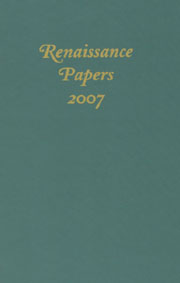Book contents
- Frontmatter
- Contents
- Renaissance Papers
- John Donne and the Practice of Priesthood
- Charity, Halifax, and Utopia: The Disadvantageous Setting of Thomas Browne's Religio Medici
- Presbyterian Church and State Before The Solemn League and Covenant
- The Flaw in Paradise: The Critique of Idealism in Margaret Cavendish's The Blazing World
- “Conceited portraiture before his Book … to catch fools and silly gazers”: Some Reflections on Paradise Lost and the Tradition of the Engraved Frontispiece
- “But Smythes Must Speake”: Women's and Commoners' Voices in the Mirror for Magistrates
- Fit for a King: The Manuscript Psalms of King James VI/I
- The Suicide of Lavinia: Finding Rome in Titus Andronicus
- The Language of Gods: Rhetoric and the Construction of Masculinity in Julius Caesar
The Suicide of Lavinia: Finding Rome in Titus Andronicus
Published online by Cambridge University Press: 12 September 2012
- Frontmatter
- Contents
- Renaissance Papers
- John Donne and the Practice of Priesthood
- Charity, Halifax, and Utopia: The Disadvantageous Setting of Thomas Browne's Religio Medici
- Presbyterian Church and State Before The Solemn League and Covenant
- The Flaw in Paradise: The Critique of Idealism in Margaret Cavendish's The Blazing World
- “Conceited portraiture before his Book … to catch fools and silly gazers”: Some Reflections on Paradise Lost and the Tradition of the Engraved Frontispiece
- “But Smythes Must Speake”: Women's and Commoners' Voices in the Mirror for Magistrates
- Fit for a King: The Manuscript Psalms of King James VI/I
- The Suicide of Lavinia: Finding Rome in Titus Andronicus
- The Language of Gods: Rhetoric and the Construction of Masculinity in Julius Caesar
Summary
TITUS Andronicus has never found a fixed place in Shakespeare's canon. Despite its setting, a long critical tradition has excluded this play from scholarly considerations of Shakespeare's Rome. As Robert Miola has pointed out, “the most striking feature of modern critical reaction to Titus Andronicus is the persistent refusal to consider it one of Shakespeare's Roman plays.” In recent years, Titus Andronicus (Titus) has enjoyed critical reappraisal and a rise in reputation, no doubt due in part to a revival in stage productions and Julie Taymor's popular film adaptation. A few decades of renewed attention to the text, however, have done little to mitigate centuries of dismissal, and have done nothing to settle the debate over Titus's position in Shakespeare's canon. As Gordon Braden notes, many studies dealing with Shakespeare's Roman works still limit themselves to the traditional triumvirate of Roman plays first set forth by M. W. MacCallum in 1910. In 2003, exploring the controversy over Titus's inclusion in the Roman canon, and reviewing the recent trend to include the play in Roman studies, Braden argues that “I also think that it would be a mistake to announce either the end or the obsolescence of the critical tradition descending from MacCallum, of more or less isolated attention to Julius Caesar, Antony and Cleopatra, and Coriolanus.” Although some recent books have included Titus in their explorations of Shakespeare's Rome, many others either exclude the play or banish it to an appendix, and the debate over Titus's proper place in the canon remains unresolved.
- Type
- Chapter
- Information
- Renaissance Papers 2007 , pp. 111 - 124Publisher: Boydell & BrewerPrint publication year: 2008



